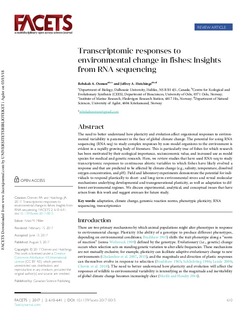Transcriptomic responses to environmental change in fishes: Insights from RNA sequencing
Journal article
Published version
Permanent lenke
http://hdl.handle.net/11250/2491220Utgivelsesdato
2017Metadata
Vis full innførselSamlinger
Sammendrag
The need to better understand how plasticity and evolution affect organismal responses to environmental variability is paramount in the face of global climate change. The potential for using RNA sequencing (RNA-seq) to study complex responses by non-model organisms to the environment is evident in a rapidly growing body of literature. This is particularly true of fishes for which research has been motivated by their ecological importance, socioeconomic value, and increased use as model species for medical and genetic research. Here, we review studies that have used RNA-seq to study transcriptomic responses to continuous abiotic variables to which fishes have likely evolved a response and that are predicted to be affected by climate change (e.g., salinity, temperature, dissolved oxygen concentration, and pH). Field and laboratory experiments demonstrate the potential for individuals to respond plastically to short- and long-term environmental stress and reveal molecular mechanisms underlying developmental and transgenerational plasticity, as well as adaptation to different environmental regimes. We discuss experimental, analytical, and conceptual issues that have arisen from this work and suggest avenues for future study.

